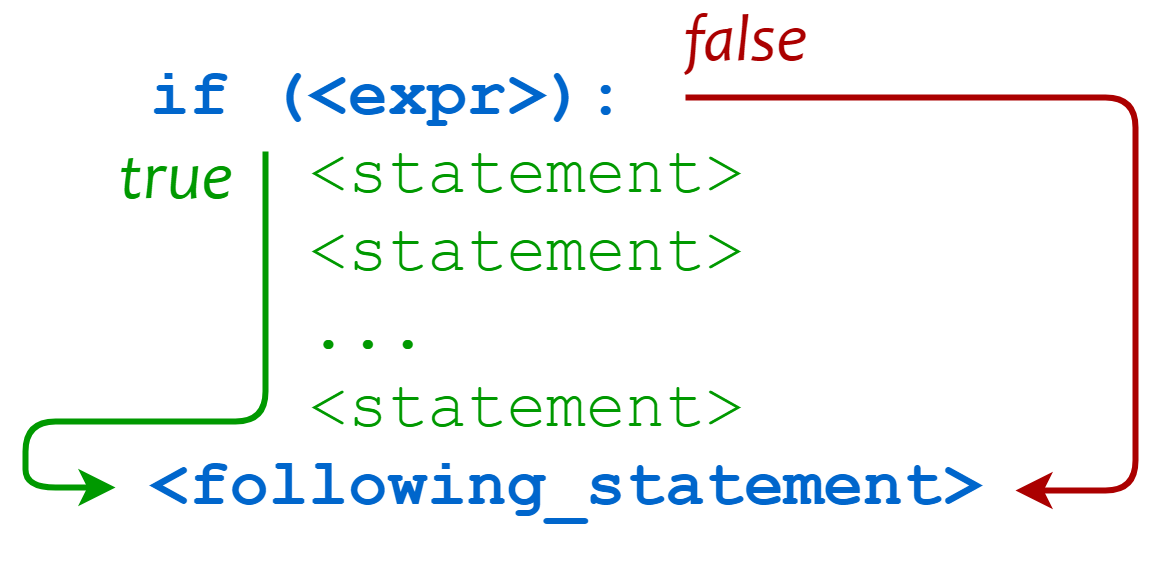Conditionals#
Overview#
Definition
Conditional statements are essential programming constructs that allow us to make decisions based on certain conditions. These statements evaluate an expression and execute specific code blocks based on whether the condition is true or false. The most common conditional statements are
if,else if,else, nestedif, andswitch.
Use Cases
- Decision-making
Executing different code based on specific conditions.
- Input Validation
Checking user input for validity before processing it.
- Flow Control
Controlling program flow based on conditions.
- Error Handling
Handling specific error conditions.
- Menu Selection
Implementing menu-driven applications.
Pros & Cons
Improved Control
Allows the program to make dynamic decisions during runtime.
Readable Code
Conditional statements enhance code readability by expressing intent clearly.
Saves Resources
Prevents unnecessary execution of code, optimizing resource utilization.
Complexity
Multiple nested conditions can make code harder to maintain and understand.
Code Duplication
Repeating code blocks for similar conditions can lead to code duplication.
Potential Bugs
Incorrect conditions or missing cases can introduce bugs.
if, else if, else Syntax#
2#include <iostream>
3using namespace std;
4
5int main() {
6 int exam_score;
7 int passing_threshold = 60;
8
9 cout << "Enter your exam score: ";
10 cin >> exam_score;
11
12 if (exam_score >= passing_threshold) {
13 cout << "Congratulations! You passed the exam." << endl;
14 } else {
15 cout << "Unfortunately, you did not pass the exam. Please try again." << endl;
16 }
17
18 return 0;
19}
1passing_threshold = 60
2
3exam_score = int(input("Enter your exam score: "))
4
5if exam_score >= passing_threshold:
6 print("Congratulations! You passed the exam.")
7else:
8 print("Unfortunately, you did not pass the exam. Please try again.")
1import java.util.Scanner;
2
3public class Main {
4 public static void main(String[] args) {
5 Scanner scanner = new Scanner(System.in);
6 int passing_threshold = 60;
7
8 System.out.print("Enter your exam score: ");
9 int exam_score = scanner.nextInt();
10
11 if (exam_score >= passing_threshold) {
12 System.out.println("Congratulations! You passed the exam.");
13 } else {
14 System.out.println("Unfortunately, you did not pass the exam. Please try again.");
15 }
16 }
17}
1use std::io;
2
3fn main() {
4 let passing_threshold = 60;
5
6 println!("Enter your exam score: ");
7 let mut input = String::new();
8 io::stdin().read_line(&mut input).expect("Failed to read line");
9 let exam_score: i32 = input.trim().parse().expect("Please enter a valid number");
10
11 if exam_score >= passing_threshold {
12 println!("Congratulations! You passed the exam.");
13 } else {
14 println!("Unfortunately, you did not pass the exam. Please try again.");
15 }
16}
1package main
2
3import (
4 "fmt"
5)
6
7func main() {
8 var passing_threshold int = 60
9 var exam_score int
10
11 fmt.Print("Enter your exam score: ")
12 fmt.Scan(&exam_score)
13
14 if exam_score >= passing_threshold {
15 fmt.Println("Congratulations! You passed the exam.")
16 } else {
17 fmt.Println("Unfortunately, you did not pass the exam. Please try again.")
18 }
19}
Output
We prompt the user to enter their exam score and compare it with the
passing_thresholdvalue of60. If theexam_scoreis greater than or equal to60, the program outputs a success message indicating that the student passed the exam. Otherwise, it prints a message stating that the student did not pass and should try again.Assume the user enters
75as input for all the examples.Since the input
75is greater than the passing threshold of60, the output is: `Congratulations! You passed the exam.``.
Congratulations! You passed the exam.
switch / match Syntax#
FUNCTION name_of_function (parameter1, parameter2, ...):
// Function implementation here
RETURN result
Rules of Use :
1#include <iostream>
2using namespace std;
3
4int main() {
5 int day_number;
6
7 cout << "Enter a day number (1 to 7): ";
8 cin >> day_number;
9
10 switch (day_number) {
11 case 1:
12 cout << "Sunday" << endl;
13 break;
14 case 2:
15 cout << "Monday" << endl;
16 break;
17 case 3:
18 cout << "Tuesday" << endl;
19 break;
20 case 4:
21 cout << "Wednesday" << endl;
22 break;
23 case 5:
24 cout << "Thursday" << endl;
25 break;
26 case 6:
27 cout << "Friday" << endl;
28 break;
29 case 7:
30 cout << "Saturday" << endl;
31 break;
32 default:
33 cout << "Invalid day number. Please enter a number between 1 and 7." << endl;
34 break;
35 }
36
37 return 0;
38}
Rules of Use :
1day_number = int(input("Enter a day number (1 to 7): "))
2
3if day_number == 1:
4 print("Sunday")
5elif day_number == 2:
6 print("Monday")
7elif day_number == 3:
8 print("Tuesday")
9elif day_number == 4:
10 print("Wednesday")
11elif day_number == 5:
12 print("Thursday")
13elif day_number == 6:
14 print("Friday")
15elif day_number == 7:
16 print("Saturday")
17else:
18 print("Invalid day number. Please enter a number between 1 and 7.")
Rules of Use :
1import java.util.Scanner;
2
3public class Main {
4 public static void main(String[] args) {
5 Scanner scanner = new Scanner(System.in);
6 int day_number;
7
8 System.out.print("Enter a day number (1 to 7): ");
9 day_number = scanner.nextInt();
10
11 switch (day_number) {
12 case 1:
13 System.out.println("Sunday");
14 break;
15 case 2:
16 System.out.println("Monday");
17 break;
18 case 3:
19 System.out.println("Tuesday");
20 break;
21 case 4:
22 System.out.println("Wednesday");
23 break;
24 case 5:
25 System.out.println("Thursday");
26 break;
27 case 6:
28 System.out.println("Friday");
29 break;
30 case 7:
31 System.out.println("Saturday");
32 break;
33 default:
34 System.out.println("Invalid day number. Please enter a number between 1 and 7.");
35 break;
36 }
37 }
38}
Rules of Use :
1use std::io;
2
3fn main() {
4 let mut day_number = String::new();
5
6 println!("Enter a day number (1 to 7): ");
7 io::stdin().read_line(&mut day_number).expect("Failed to read line");
8 let day_number: i32 = day_number.trim().parse().expect("Please enter a valid number");
9
10 match day_number {
11 1 => println!("Sunday"),
12 2 => println!("Monday"),
13 3 => println!("Tuesday"),
14 4 => println!("Wednesday"),
15 5 => println!("Thursday"),
16 6 => println!("Friday"),
17 7 => println!("Saturday"),
18 _ => println!("Invalid day number. Please enter a number between 1 and 7."),
19 }
20}
Rules of Use :
1package main
2
3import (
4 "fmt"
5)
6
7func main() {
8 var day_number int
9
10 fmt.Print("Enter a day number (1 to 7): ")
11 fmt.Scan(&day_number)
12
13 switch day_number {
14 case 1:
15 fmt.Println("Sunday")
16 case 2:
17 fmt.Println("Monday")
18 case 3:
19 fmt.Println("Tuesday")
20 case 4:
21 fmt.Println("Wednesday")
22 case 5:
23 fmt.Println("Thursday")
24 case 6:
25 fmt.Println("Friday")
26 case 7:
27 fmt.Println("Saturday")
28 default:
29 fmt.Println("Invalid day number. Please enter a number between 1 and 7.")
30 }
31}
Output
We take a user input for the day_number and use a switch statement (or if-elif statements in Python) to display the corresponding day of the week. Assuming the user input is
3, the output for each program isTuesday.
Tuesday

